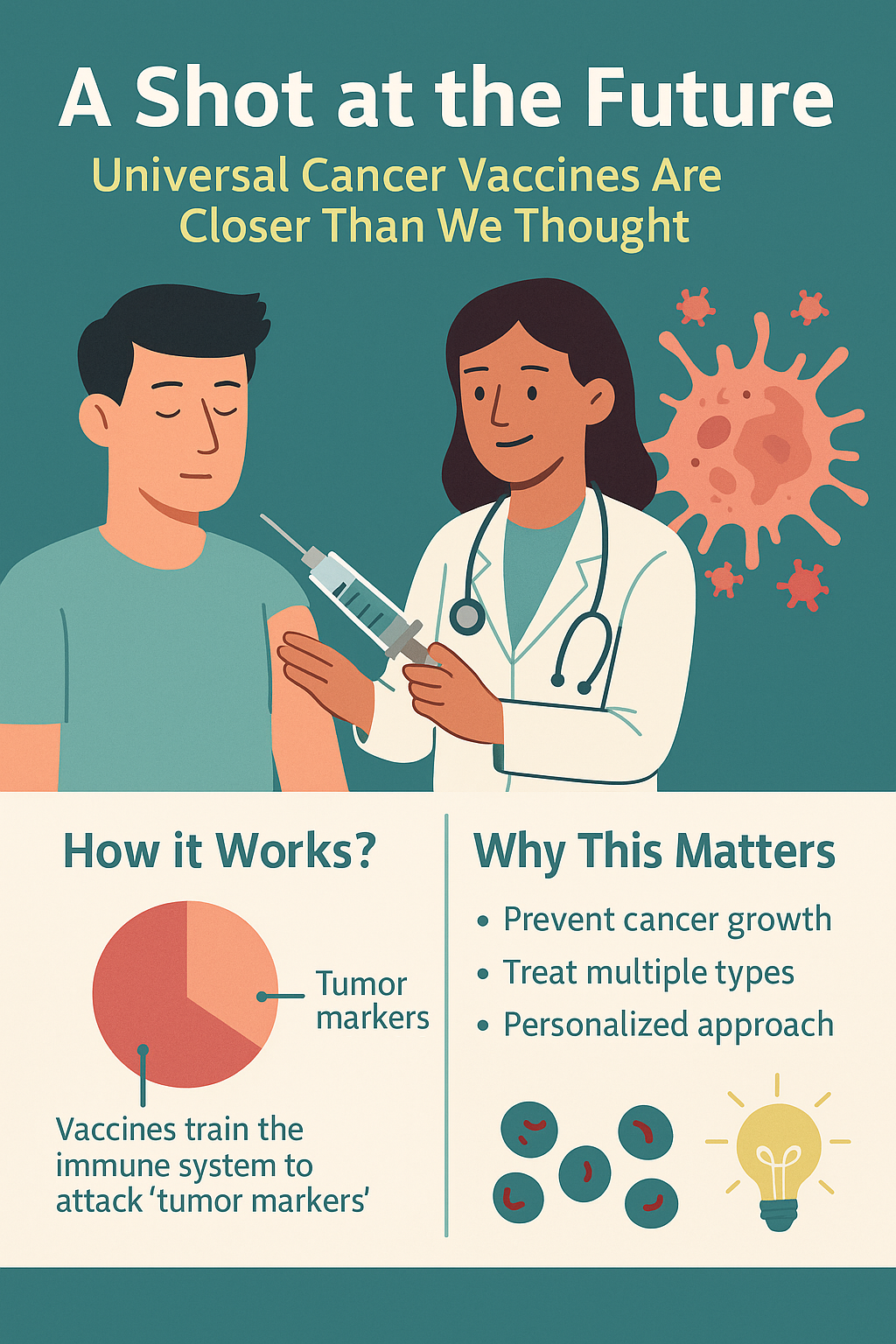🧬 A Shot at the Future: Universal Cancer Vaccines Are Closer Than We Thought

Exploring the UK's NHS "Cancer Vaccine Launch Pad" and the New mRNA Trials for a Universal Solution
Welcome Back, Varrock Street Journal Community!
What if one shot could prevent or even treat multiple types of cancer?
It might sound like science fiction—but today’s topic is anything but. Following up on two major news stories from the UK’s National Health Service and global biotech leaders, we’re looking at a new “launch pad” for personalized cancer vaccine trials and a bold effort to create a universal cancer vaccine using mRNA technology.
We’ll break down what cancer really is, how these vaccines are expected to work, and what this could mean for millions of patients. Buckle in—this is the science of hope.
🧪 What Is Cancer, Really?
At its core, cancer is a disease of uncontrolled cell growth. Our bodies are made up of trillions of cells that grow, divide, and die in a highly regulated cycle. This regulation is enforced by a series of molecular signals and checkpoints—like stoplights at an intersection—that ensure cells divide only when needed and die when they’re damaged or old.
Cancer occurs when this control system breaks down.
Most cancers begin with genetic mutations—small changes in a cell’s DNA that affect genes responsible for controlling growth and repair. These can be inherited, caused by environmental exposure (like UV light or tobacco smoke), or happen randomly as cells replicate. As mutations accumulate, cells begin to ignore the usual rules: they divide when they shouldn’t, evade the immune system, resist death, and even send out signals to grow new blood vessels to feed their growth (a process called angiogenesis).
Over time, cancerous cells can invade nearby tissues and spread to distant parts of the body through the bloodstream or lymphatic system—a process known as metastasis. This is what makes cancer especially dangerous. It’s not just a single disease, but rather a collection of related diseases—over 100 types—each with its own genetic and environmental triggers.
Modern science now classifies cancers by:
- Tissue of origin (e.g., breast, lung, colon)
- Genetic mutations present
- Cellular markers (which influence treatment decisions)
This growing understanding of the molecular biology of cancer is exactly what’s driving innovation in personalized vaccines, targeted therapies, and immunotherapies—like the ones discussed in our newsletter today.
Here is a quick video on how cancer begins in the body!
💉 The NHS Cancer Vaccine Launch Pad
The UK’s NHS recently launched a Cancer Vaccine Launch Pad—a nationwide initiative to connect eligible patients with cutting-edge clinical trials for personalized cancer vaccines. These vaccines are tailored to a patient’s unique tumor DNA. After surgery or biopsy, the tumor’s genetic code is analyzed to identify "neoantigens"—mutated proteins specific to that tumor. The vaccine then trains the immune system to recognize and destroy those exact mutations.
This initiative could eventually treat patients with:
- Melanoma
- Bladder cancer
- Pancreatic cancer
- Lung cancer
- And more.
It’s part of a larger goal to enroll 10,000 patients by 2030 into cancer vaccine trials in the UK alone.
🌍 The Universal Cancer Vaccine Approach
In another major step forward, researchers working with BioNTech and other institutions are developing a “pan-cancer” vaccine. Instead of targeting individual neoantigens in a single patient, this approach aims to identify shared tumor markers that appear across many different cancer types.
Using mRNA vaccine platforms (just like the COVID-19 vaccines), scientists are teaching the immune system to identify these common cancer proteins and respond aggressively—ideally preventing tumor growth or recurrence.
What’s the big deal? A universal vaccine could:
- Treat multiple types of cancers with a single shot
- Work across a broader population without personal customization
- Be produced more quickly and affordably than bespoke options
🔬 Why This Matters
Traditional cancer treatments like chemotherapy and radiation kill both healthy and cancerous cells, causing serious side effects. Immunotherapies, including vaccines, aim to be smarter, safer, and more targeted.
This isn’t just a medical milestone—it’s a potential paradigm shift.
These vaccines could also be used preventively in people with high genetic risks or therapeutically to prevent recurrence in patients in remission. Think: a world where "catching cancer early" also means "defeating it early.”
This is how cancer spreads! Great Ted Talk.
🔭 Spotlight on Future Applications
- Combination therapies: Cancer vaccines may work best when paired with immunotherapy drugs like checkpoint inhibitors.
- Early prevention: High-risk individuals (like BRCA gene carriers) could receive tailored mRNA vaccines before cancer even develops.
- Global equity: Universal vaccines could reduce disparities in cancer outcomes by providing cost-effective options to low-resource areas.
💡 Did You Know?
Cancer cells often wear “molecular disguises” that allow them to hide from the immune system. Cancer vaccines aim to unmask them—turning stealth into a signal for destruction.
🧠 Reflection Questions
- Would you consider enrolling in a cancer vaccine trial if you were eligible?
- How do you think mRNA technology will shape treatments for diseases beyond cancer?
- What ethical or logistical issues do you think could arise as personalized medicine becomes more common?
📚 References (APA Style)
- England NHS. (2024). NHS Cancer Vaccine Launch Pad. https://www.england.nhs.uk/cancer/nhs-cancer-vaccine-launch-pad/
- Haridy, R. (2024, May 8). Universal cancer vaccine enters human trials. New Atlas. https://newatlas.com/cancer/universal-cancer-vaccine/
- National Cancer Institute. (2023). What is cancer? https://www.cancer.gov/about-cancer/understanding/what-is-cancer
- BioNTech SE. (2024). Pipeline and oncology portfolio. https://biontech.com/our-science
📣 Follow Us
For more fascinating reads, follow us on:
📸 Instagram: @thevarrockstreetjournal
🎥 TikTok: @varrock.street.jo
